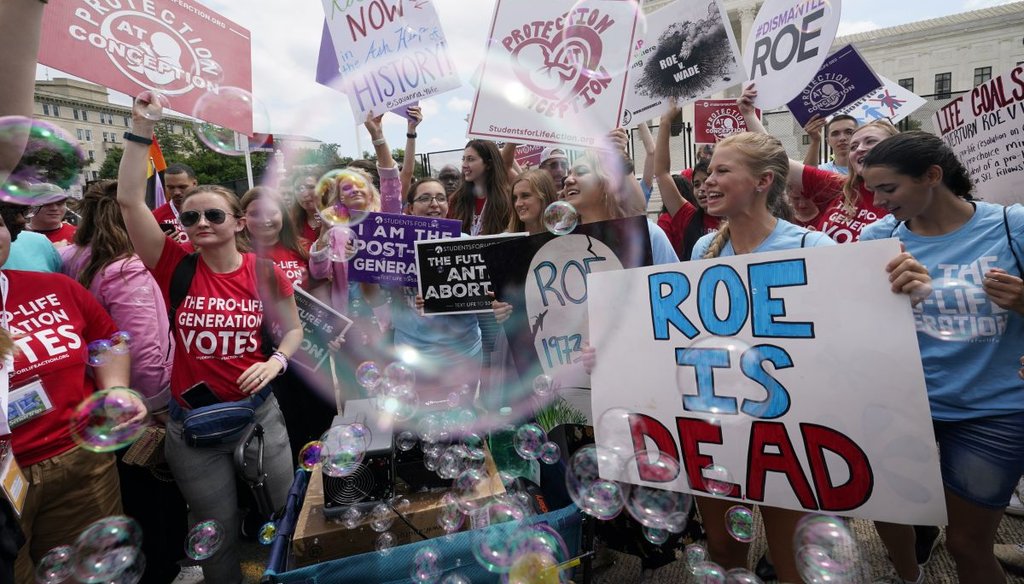Get PolitiFact in your inbox.

A celebration by opponents of abortion outside the Supreme Court on June 24, 2022. (AP)
When the U.S. Supreme Court on June 24, 2022, overturned Roe v. Wade, holding that there was no longer a federal constitutional right to an abortion, the ruling ignited a firestorm across the country.
So, it’s not surprising two fact-checks on issues related to the ruling and abortion took the top two spots in our "High Five" for June. The feature looks at the most-clicked items from the previous month.
1. U.S. Sen. Tammy Baldwin, D-Wis.: "Our Supreme Court has never taken away a constitutional right."
Baldwin made the comment after the leak of a draft opinion from the U.S. Supreme Court that showed the court was poised to overturn Roe v. Wade, which guaranteed the right to an abortion. Legal scholars told us reversals are "uncommon, but not unprecedented," and two professors of constitutional law described the same scenarios that made her statement off base.
One example begins with the 1905 Lochner v. New York case, which found that a law forbidding bakers to work more than 60 hours a week, or 10 hours in a day, interfered with "right of contract." The court linked that right to the 14th amendment’s due process clause; essentially, that there was a constitutional right for employers and employees to set their own terms of employment.
That case set off what is known as the "Lochner era," when the court struck down a number of laws trying to set minimum wages, maximum hours and working conditions. That changed in the 1930s with a number of New Deal-era cases in which the court departed from its previous view of right of contract protected in the 14th amendment.
A second instance was the 1990 Employment Division v. Smith case, which found that the First Amendment’s Free Exercise Clause did not contain the right to religious exemptions to "generally applicable" laws. In this particular case, the court decided the state of Oregon could deny unemployment benefits to two employees who were fired for taking illegal drugs that they were using for religious purposes.
That case reversed the 1963 Sherbert vs. Verner decision that declared a right to religious exemptions from such laws under the Free Exercise Clause.
We rated Baldwin’s claim False.
2. Gov. Tony Evers: "Wisconsin's archaic abortion ban is older than 20 states."
As the nation was awaiting the Supreme Court decision, Evers’ reelection campaign waded into the fray with the statement on Wisconsin’s 173-year-old law — one that nearly dates to the state’s inception — that criminalizes abortion except in cases where it is necessary to save the mother’s life.
When Roe vs. Wade was overturned, that law took effect — though some argue it has been superseded by other laws, and some law enforcement officials say they won’t enforce it.
An Encyclopedia Britannica list states admitted to the union after the 1849 Wisconsin law did tally 20.
We rated the claim True.
3. Democratic Party of Wisconsin: "The tax carve out (Ron) Johnson spearheaded overwhelmingly benefited the wealthiest, over small businesses."
The Democratic Party of Wisconsin honed in on an action U.S. Sen. Ron Johnson, R-Wis., took at the beginning of his second term: He withheld his yes vote on the 2017 Tax Cuts and Jobs Act unless the bill included a tax break for companies known as "pass-throughs" — those that pass all their income on to the owners or investors. Companies structured this way (often small, family-owned businesses) are not subject to corporate income tax.
Once that tax break was added, Johnson voted yes and the bill passed.
We found that multiple analyses showed America’s millionaires and billionaires are receiving large chunks of those benefits.
We rated the claim True.
4. State Sen. Van Wanggaard, R-Racine: Waiting periods for gun purchases may not make a difference, because "If somebody's decided that they're gonna take their life, they're gonna take their life."
The mass shooting at an Uvalde, Texas, elementary school on May 24 — the second-deadliest school shooting in the nation’s history — resurfaced arguments for stricter gun laws in the Wisconsin Legislature.
Although research on the effectiveness of 48-hour waiting periods on reducing overall violence is mixed, studies show it can reduce suicide deaths in particular. Furthermore, experts say many suicide deaths are preventable.
We rated the claim False.
5. Former Lt. Gov. Rebecca Kleefisch: "Joe Biden’s margin of the less than 21,000 votes in Wisconsin was the tightest of any state in 2020."
When asked for backup, Kleefisch’s team said the fundraising email with the claim contained an error and should read that the margin in Wisconsin was among the tightest in any state.
According to a December 2020 NPR article, two other states came in with a smaller margin than the 20,682 votes by which Democrat Joe Biden topped then-President Donald Trump in Wisconsin. In Arizona, Biden won by 10,457 votes, and in Georgia, he won by 12,670 votes.
We rated the claim False.
Our Sources
PolitiFact Wisconsin


















































